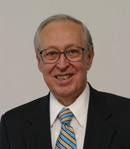 This week Prof. Talat Halman, Dean of the Faculty of Humanities and Letters, shares with Bilkent News his thoughts about Turkey's capital city, Ankara. Prof. Halman was Turkey's first Minister of Culture, and inaugurated the Ministry. He also served as Turkey's first Ambassador of Cultural Affairs. This week Prof. Talat Halman, Dean of the Faculty of Humanities and Letters, shares with Bilkent News his thoughts about Turkey's capital city, Ankara. Prof. Halman was Turkey's first Minister of Culture, and inaugurated the Ministry. He also served as Turkey's first Ambassador of Cultural Affairs.
Professor Halman, how long have you lived in Ankara?
I have spent 18 of my 78 years in Ankara - the remaining 60 years in İstanbul, Paris, Ann Arbor (Michigan), and New York City. My years in Ankara as a child were happy and stimulating. I've served as a reserve officer and Minister of Culture, as well as a Bilkent-er, all of it exciting and fascinating.
Does Ankara really try to preserve its history?
Ankara has tried admirably to preserve its history, one that is astonishingly ancient and variegated. Yet, woefully, few major archaeological sites, monuments, and places of worship exist. Ankara has no extant places, amphitheaters, libraries, forums, etc. Its human settlements date back to 52,000 B.C. (some scholars claim, to 60,000 B.C.). As a city, it has a 3,000 year history through the Paleolithic, Stone Age, Neolithic, Chalcolithic, Bronze Age, Assyrian, Hattian, Roman, Byzantine, Selçuk, Ottoman, and Modern Turkish eras. But, Ankara's cultural heritage, as it stands, is disappointing, almost skimpy except for precious few remains.
 Are there enough museums or other cultural heritage sites in Ankara? Are there enough museums or other cultural heritage sites in Ankara?
We should have a great many more general, specialized, encyclopedic, and thematic museums. Our "Museum of Anatolian Civilizations" is superb, but a capital city with a population of five million in the coming decade will need a proliferation of museums, theaters, concert halls and other cultural facilities to accommodate its population. Ankara's archaeological potential is probably estimable. An energetic program of excavations could unearth tremendous riches, but metropolitan growth is rapidly reducing our chances of impressive archaeological discoveries. Pity.
What can you say about our capital, when you compare it to other nations' capitals around Europe?
Ankara is lackluster compared with major historical cities that serve as capitals - Rome, Paris, Athens, London, Madrid, Vienna, but superior to Sofia, Tirana, Brussels, Zagreb.
What can you say about Ankara's transformation when you compare the city to how it was 40 years ago?
Ankara was a shabby town for many centuries - dim and grim in the 1910s. Mustafa Kemal Pasha chose it not merely as the new Turkey's capital but as the center of creativity for sociopolitical reform, cultural revolution, architectural bravura, economic development, educational progress, and urbanism. Ankara had begun to rise to the challenges of Atatürk's vision, but after the 1950s it retrogressed when it fell prey to unplanned and unimaginative growth. It got crushed under the weight of bloated bureaucracy and kakocracy. In the past 40 years Ankara has had no transformation, only unconscionable growth.
Can we honestly say that Ankara is a city with a vibrant culture?
Ankara can boast of a vibrant culture thanks to the intellectual and artistic vitality of its universities. What transpires outside the academic world has hardly become extensive since the 1960s. The city has occasional vibes, but lacks vibrancy.
Do you think İstanbul has more culture to offer than Ankara? Why or why not?
Yes, a great deal more, but unfortunately Istanbul's cultural activities leave a lot to be desired for an ancient, cosmopolitan metropolis with 15-million people. The coming decades will witness a huge resurgence - a cultural boom - the emergence of an "arts paradise" in Istanbul. That is a city par excellence. It is destined to become a megalopolis of world cultures.
What are things you enjoy while you are in Ankara? What do you like to do in Ankara in your free time?
The measure of a great city is its talent for offering pleasurable distractions. Ankara stands devoid of distractions, surprises, or ecological joys. There is so little to see, to do or enjoy. That enables me to turn inward, to meditate, read and write, to get absorbed into a life of creative privacy.
Here I should offer paeans to Bilkent and its vicinity. In less than a quarter of a century, Bilkent has become a "model city," an exemplary community of learning, health, safety, science and art, technology and music. Bilkent and its environs make Ankara proud, and inspire all of Turkey in the right direction toward urban excellence. Within a radius of a few dozen miles, we have six major universities, several world-class hospitals, one of the world's most impressive concentrations of university graduates and Ph.D.-holders, several symphony orchestras and technoparks, theatres, museums and concert halls, and many cultural institutions. We are uniquely fortunate: Bilkent is a hub of urban civilization. Life here is stimulating, creative, and exciting.

|







